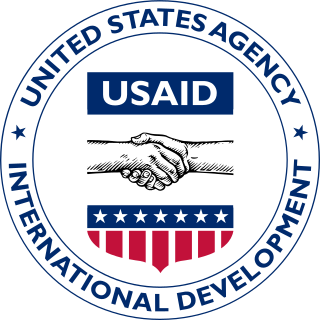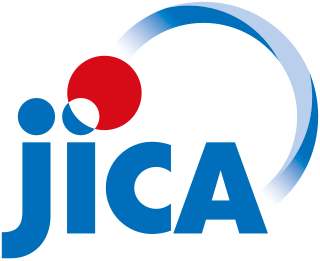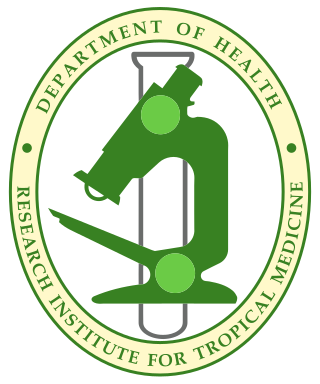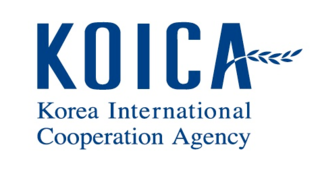Related Research Articles

Foreign relations of Kazakhstan are primarily based on economic and political security consideration. The Nazarbayev administration has tried to balance relations with Russia and the United States by sending petroleum and natural gas to its northern neighbor at artificially low prices while assisting the U.S. in the War on Terror. Kazakhstan is a member of the United Nations, Collective Security Treaty Organization, Organization for Security and Co-operation in Europe, North Atlantic Cooperation Council, Commonwealth of Independent States, the Shanghai Cooperation Organisation, and NATO's Partnership for Peace program. Kazakhstan established a customs union with Russia and Belarus which eventually became the Eurasian Economic Union. President Nazarbayev has prioritized economic diplomacy into Kazakhstan's foreign policy.

The United States Agency for International Development (USAID) is an independent agency of the United States government that is primarily responsible for administering civilian foreign aid and development assistance. With a budget of over $50 billion, USAID is one of the largest official aid agencies in the world and accounts for more than half of all U.S. foreign assistance—the highest in the world in absolute dollar terms.

The French Development Agency is a public financial institution that implements the policy defined by the French Government. It works to fight poverty and promote sustainable development. This public institution is active in Africa, Asia, the Middle East, Latin America, the Caribbean and the French overseas territories, where it finances and supports projects that improve living conditions for populations, promote economic growth and protect the planet.

Development aid is a type of aid given by governments and other agencies to support the economic, environmental, social, and political development of developing countries. It is distinguished from humanitarian aid by aiming at a sustained improvement in the conditions in a developing country, rather than short-term relief. The overarching term is foreign aid. The amount of foreign aid is measured though official development assistance (ODA). This is a category used by the Development Assistance Committee (DAC) of the Organisation for Economic Co-operation and Development (OECD) to measure foreign aid.

In international relations, aid is – from the perspective of governments – a voluntary transfer of resources from one country to another. The type of aid given may be classified according to various factors, including its intended purpose, the terms or conditions under which it is given, its source, and its level of urgency. For example, aid may be classified based on urgency into emergency aid and development aid.

An export credit agency or investment insurance agency is a private or quasi-governmental institution that acts as an intermediary between national governments and exporters to issue export insurance solutions and guarantees for financing. The financing can take the form of credits or credit insurance and guarantees or both, depending on the mandate the ECA has been given by its government. ECAs can also offer credit or cover on their own account. This does not differ from normal banking activities. Some agencies are government-sponsored, others private, and others a combination of the two.

The Japan International Cooperation Agency, also known as JICA, is a governmental agency that delivers the bulk of Official Development Assistance (ODA) for the government of Japan. It is chartered with assisting economic and social growth in developing countries and promoting international cooperation. According to the OECD, Japan's total official development assistance (ODA) increased in 2022 due to an increase in its bilateral lending, which included support to Ukraine. ODA represented 0.39% of gross national income (GNI). The OECD's Development Assistance Committee published a peer review of Japan's development cooperation in October 2020. JICA was led by Shinichi Kitaoka, the former President of the International University of Japan, from 2015 to 2022. On 1 April 2022, Professor Akihiko Tanaka assumed the presidency.

Australian Aid is the brand name used to identify projects in developing countries supported by the Australian Government. As of 2014 the Department of Foreign Affairs and Trade (DFAT) has been responsible for Australia's official development assistance to developing countries.
Japan emerged as one of the largest foreign aid donors in the world during the 1980s.

The Directorate-General for International Partnerships is the European Commission department responsible for international development policy. It operates under the authority of the European Commissioner for International Partnerships, Jutta Urpilainen.

The Organisation for Economic Co-operation and Development's (OECD) Development Assistance Committee (DAC) is a forum to discuss issues surrounding aid, development and poverty reduction in developing countries. It describes itself as being the "venue and voice" of the world's major donor countries.

The Japan Bank for International Cooperation, JBIC, is a Japanese public financial institution and export credit agency that was created on October 1, 1999, through the merger of the Japan Export-Import Bank (JEXIM) and the Overseas Economic Cooperation Fund (OECF).

The Research Institute for Tropical Medicine is a health research facility based in Muntinlupa, Philippines.
Tokyo International Conference on African Development (TICAD) is a conference held regularly with the objective "to promote high-level policy dialogue between African leaders and development partners." Japan is a co-host of these conferences. Other co-organizers of TICAD are the United Nations Office of the Special Advisor on Africa (UN-OSAA) and the United Nations Development Programme (UNDP). The series has included: TICAD I (1993); TICAD II (1998); TICAD III (2003); TICAD IV (2008); TICAD V (2013). The next conference is scheduled for Kenya in August 2016. It will be the first time the event will be held in Africa, previous conferences were all held in Japan.

The New Zealand Aid Programme is the New Zealand Government's international aid and development agency. The New Zealand Aid Programme is managed by the Pacific and Development Group in the New Zealand Ministry of Foreign Affairs and Trade (MFAT). Previously a semi-autonomous body known as the New Zealand Agency for International Development (NZAID), it was reintegrated back into MFAT as the International Development Group following a restructure in 2009. Its Māori name is Nga Hoe Tuputupu-mai-tawhiti – the paddles that bring growth from afar. The Head of the New Zealand Aid Programme is Jonathan Kings, a lawyer and public servant. According to the OECD, New Zealand’s total official development assistance (ODA) decreased in 2022 due to fewer disbursements within its three-year budget cycle and represented 0.23% of gross national income (GNI).
The Official Development Assistance is an arm of the Ministry of Foreign Affairs (Japan). The goal of the office is to help developing nations with supplies, civil engineering and other assistance. The ODA was started in 1954 after Japan signed the Colombo Plan, which pledges to provide aid to nations who need it. As of 2003, the ODA has provided over $221 billion USD to 185 nations and regions. The main institution that is managing Japanese ODA is Japan International Cooperation Agency.

The Korea International Cooperation Agency was established in 1991 by the Ministry of Foreign Affairs of South Korea as a governmental organization for Official Development Assistance (ODA). KOICA's goal is to enhance the effectiveness of South Korea's grant aid programs for developing countries by implementing the government's grant aid and technical cooperation programs. KOICA is led by three-year-term president of the board who is appointed by the President upon the recommendation of Foreign Minister.
The East Asia Climate Partnership (EACP) is Korea's international initiative for global cooperative development. Led by the Korea International Cooperation Agency (KOICA), a Korean government agency responsible for providing overseas grant aid, the EACP helps tackle climate change in developing countries and promotes green growth in Asia.
Chinese foreign aid may be considered as both governmental (official) and private development aid and humanitarian aid originating from the People's Republic of China (PRC).
References
- ↑ Japan International Cooperation Agency (March 2020). "JICA Profile" (PDF). JICA Profile. 20 (Introduction of JICA): 6. Retrieved 28 April 2020.
- ↑ Japan International Cooperation Agency (March 2020). "JICA Profile" (PDF). JICA Profile. 20: 8. Retrieved 28 April 2020.
- ↑ Japan International Cooperation Agency (March 2020). "JICA Profile" (PDF). JICA Profile. 20 (Cooperation with different regions): 10-11. Retrieved 28 April 2020.
- ↑ Japan International Cooperation Agency (March 2020). "JICA" (PDF). JICA Profile. 20 (JICA's Partnership): 16. Retrieved 28 April 2020.
- 1 2 3 Chen, Muyang (2024). The Latecomer's Rise: Policy Banks and the Globalization of China's Development Finance. Ithaca and London: Cornell University Press. ISBN 9781501775857. JSTOR 10.7591/jj.6230186.
- ↑ Rix, A 1990, ‘Japan's Foreign Aid Policy: A Capacity for Leadership?’, Pacific Affairs vol. 62, no. 4, pp. 461-475. Page 461.
- ↑ Rix, A 1990, ‘Japan's Foreign Aid Policy: A Capacity for Leadership?’, Pacific Affairs vol. 62, no. 4, pp. 461-475. Page 462.
- ↑ Kyoryoku, K & Kyokai, S 1988, Development Assistance Committee, Aid Review 1988/89, Memorandum of Japan, Organization for Economic Co-operation and Development.
- ↑ Strange, Austin (2023-12-21). Chinese Global Infrastructure (EPUB). Elements in Global China. Cambridge University Press. doi:10.1017/9781009090902. ISBN 978-1-009-09090-2.
- 1 2 Jain, P 2016, Japanese foreign aid: what's in it for Japan?, East Asia Forum, viewed 8 March 2020, <https://www.eastasiaforum.org/2016/07/21/japanese-foreign-aid-whats-in-it-for-japan/>.
- ↑ The Brookings Institution, Revising Japan's ODA charter: Aiding national security?, The Brookings Institution, viewed 8 March 2020, <https://www.brookings.edu/events/revising-japans-oda-charter-aiding-national-security/>.
